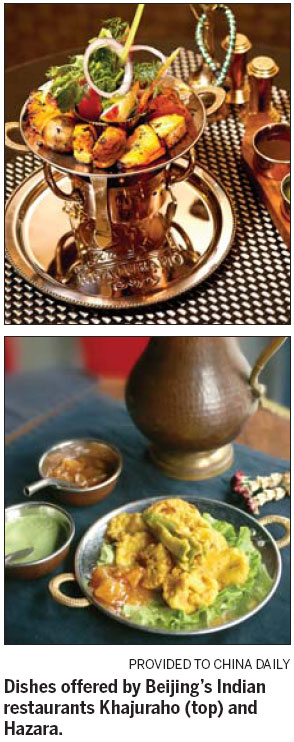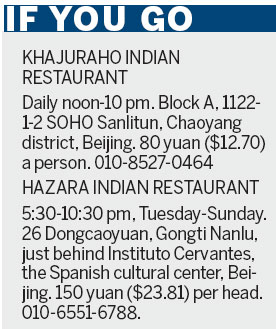Here's some spice for your life
- by Ye Jun
 0 Comment(s)
0 Comment(s) Print
Print E-mail China Daily, March 7, 2012
E-mail China Daily, March 7, 2012

My previous dining experiences at Indian restaurants in Beijing indicated there was a big difference between Chinese and Indian tastes.
Newly opened Indian restaurant Khajuraho at Sanlitun SOHO does a fairly good job of adapting to Chinese tastes.
Tandoori chicken - a white and a red version - were tasty, although a tad too salty. Roast cheese was mild, and fish meatballs soft. The rice accompanying the curry was colorful, but a bit hard. Naan was nice and crisp. Masala tea was good, but the lentil soup had a bit too much lemon and tasted too sour.
Generally speaking, the restaurant offers better Indian food than the average available in Beijing.
If one's looking for something exotic, the name Khajuraho promises that. It is the name of an Indian city with a group of temples and erotic monuments. There are pictures and introductions to the temples that have friezes from the Kama Sutra.
"Khajuraho symbolizes our love and passion for tasty and healthy Indian food that we enjoy sharing with people," says Hilary D'Souza, director of restaurant operations at Stork International GmbH, which owns the restaurant.
Before the opening of its Beijing restaurant, Khajuraho opened in Moscow, the Urals, Russia, and Ulan Bator, Mongolia. The restaurant is inspired by northern Indian cuisine, but also infuses a touch of Chinese influence.
There are many curry-based items on the menu, as well as a wide selection of tandoori meats and vegetables. Some typical curry dishes are butter chicken, palak paneer, and kadai gosht. All of their tandoori specialties are sprinkled with black sea salt, to enhance flavors.
The mangers and chefs at the restaurant are Indian, while most wait staff are Chinese. The decoration is compact and intimate. The tables are dark red, with sofas and soft-cushioned chairs. Design is not complicated, but looks Indian.
Comparatively, Hazara Indian Restaurant is a higher end establishment, which expended a lot of effort on decoration, with antiques imported from India.

An imposing set of ancient timber beams recreates the environment of a private mansion.
There are remarkable museum-quality pieces, such as a set of two Rajastani 18th century dowry chests made of teak and rosewood, besides antique Rajastani doors with iron fittings.
Hazara Indian Restaurant is named after a tribe in the northern mountains of the Indo-Afghan border. It serves "frontier" cuisine from northern India. It is a region known for its high-quality ingredients, well-balanced seasoning and frequent use of the traditional tandoor oven.
After a few months' break, the restaurant has restarted business with newly arrived chef Vikram Singh from Dehradun in north India.
Signature dishes are roasted leg of baby lamb, boneless butter chicken, and spicy tiger prawns. All meats served are halal.





